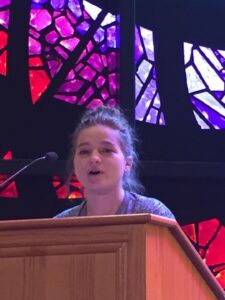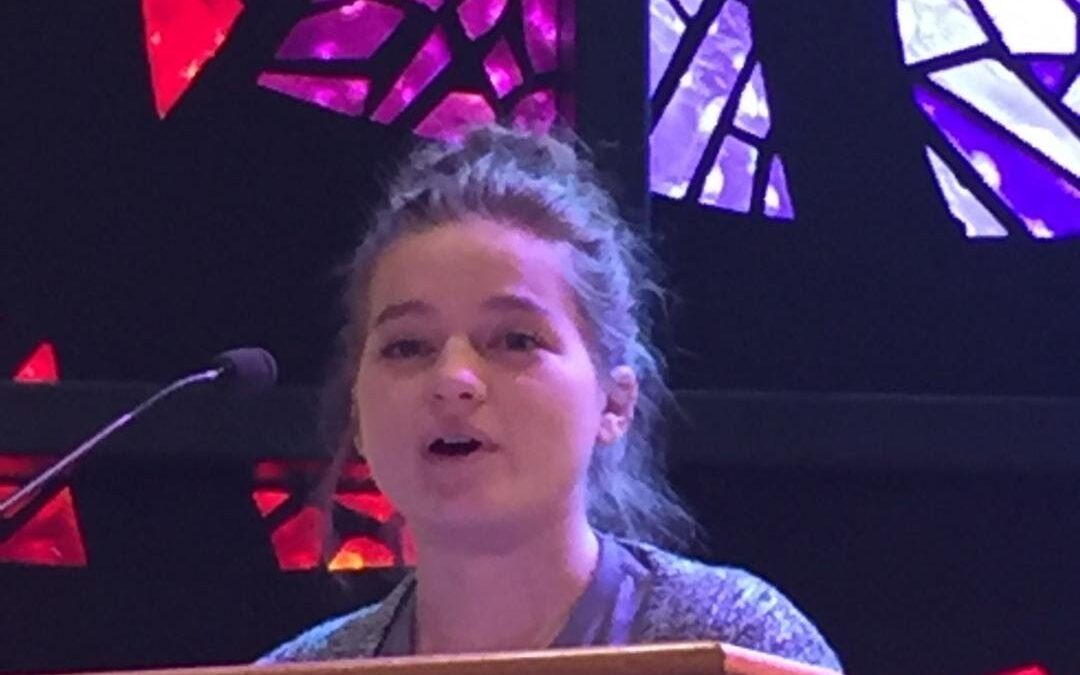Communion After Social Distancing
Grace Sosa
Of all the things I missed during the height of COVID-19, the one that surprised me most was taking Communion. Sure, my church sent home packets with a Hawaiian Roll and a can of grape juice and led us through Communion virtually. But to me, this sacrament only feels like Communion when we are together. Even the word Communion reminds us of words like common, commune, and community.
 The first time we took Communion after worshipping separately, it was still different. The bread had been cut up into small pieces and placed into individual cups. The juice cups were spread out on the trays so no one would accidentally touch someone else’s. It was different, but I still heard the sacred words, “The body of Christ, broken for you,” and “The blood of Christ poured out for you.” We still took the elements as one body of believers seated around Christ’s table. While we can watch sermons and sing songs along with a video on a computer screen, nothing can replace this aspect of worship.
The first time we took Communion after worshipping separately, it was still different. The bread had been cut up into small pieces and placed into individual cups. The juice cups were spread out on the trays so no one would accidentally touch someone else’s. It was different, but I still heard the sacred words, “The body of Christ, broken for you,” and “The blood of Christ poured out for you.” We still took the elements as one body of believers seated around Christ’s table. While we can watch sermons and sing songs along with a video on a computer screen, nothing can replace this aspect of worship.
This summer, I have been studying the Book of Confessions in preparation for my ordination exams in the Presbyterian Church (USA). I was pleased to find that I am not alone in my appreciation for this sacrament. For one, Presbyterian pastors are called ministers of Word and Sacrament. I always thought that title was a little strange. Of all the things a pastor does every week, surely preparing for and administering the sacraments takes less than an hour. Shouldn’t we be called ministers of Word and Visitation or ministers of Word and Committee Meetings? However, the more I read the confessions, the more I realized how important the sacraments are to our faith.
First, a little Reformation history. John Calvin, Martin Luther, and Ulrich Zwingli were leaders of the Reformation. While these three men worked to reform the Catholic church, they disagreed on their beliefs concerning Communion. The reformers disagreed with the Catholic Church’s belief that in the Eucharist, the bread and wine were transformed into the body and blood of Christ. Luther did believe that at the Last Supper, when Jesus said, “This is my body,” that he meant that literally. So, when we take Communion, Christ’s body and blood are really present “in, with, and under” the substance of the bread and wine.1Zwingli, on the other hand, understood Communion to be a memorial meal. When Jesus said, “This is my body,” he meant, “This signifies my body.” John Calvin took a position somewhere between Luther and Zwingli’s views. He argued that the literal body and blood of Christ were not present in the elements, but “in the Lord’s Supper believers had a real spiritually nourishing community with Christ by the power of the Holy Spirit.”2
The Scots Confession was written primarily by John Knox, a follower of Calvin. The confession tells us that in Communion, “Christ Jesus is so joined with us that he becomes the very nourishment and food of our souls.” 3 In the Lord’s Supper, we are not only joined together with other believers but we are also joined to Christ. We don’t only remember Christ’s sufferings, but Christ also gives us the strength to follow his example.
 In the Second Helvetic Confession, Heinrich Bullinger reminds believers that just as we remember the body of Christ in Communion, so should members of the church see ourselves as the body of Christ. He writes that in the Lord’s Supper, “we may be of one mind with all the brethren, live a holy life, and not pollute ourselves with wickedness.”4 Communion is an outward expression of the unity we should strive for as believers.
In the Second Helvetic Confession, Heinrich Bullinger reminds believers that just as we remember the body of Christ in Communion, so should members of the church see ourselves as the body of Christ. He writes that in the Lord’s Supper, “we may be of one mind with all the brethren, live a holy life, and not pollute ourselves with wickedness.”4 Communion is an outward expression of the unity we should strive for as believers.
In the Westminster Confession of Faith, readers are reminded that “denial of the cup to the people…[is] contrary to the nature of this sacrament, and to the institution of Christ.” 5 While believers should confess sins their sins before taking the Lord’s Supper, it is not the responsibility of the ministers to determine who is eligible to partake in the sacrament and who is not. All are welcome at the table.
Drawing from Karl Barth’s theology, The Confession of 1967 emphasizes reconciliation. It declares, “The Lord’s Supper is a celebration of the reconciliation of men with God and with one another, in which they joyfully eat and drink together at the table of their Savior.”6 Although the sacrament commemorates a solemn event, we celebrate in the unity that it brought about.
I’ll conclude with my favorite section out of the Book of Confessions. It comes from A Brief Statement of Faith: “The same Spirit who inspired the prophets and apostles rules our faith and life in Christ through Scripture, engages us through the Word proclaimed, claims us in the waters of baptism, feeds us with the bread of life and the cup of salvation, and calls women and men to all ministries of the church.” 7 Whatever your church’s theology of the Eucharist, I think every community of believers can agree that this sacrament is important to our faith. As we begin to gather around the table once again, let us be grateful for the opportunity to share this special meal together.
1 Presbyterian Church (USA), Book of Confessions: Study Edition, Revised (Louisville: Westminster John
Knox Press, 2017), 58.
2 PC(USA), Book of Confessions, 58.
3 PC(USA), Book of Confessions, 50.
4 PC(USA), Book of Confessions, 179.
5 PC(USA), Book of Confessions, 247.
6 PC(USA), Book of Confessions, 378.
7 PC(USA), Book of Confessions, 424.


